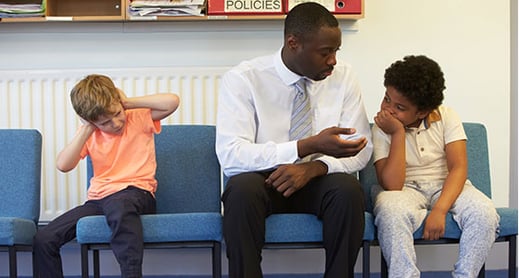
...even though today's teachers are trained to be sensitive to "social-emotional development" and schools are committed to mainstreaming children with cognitive or developmental issues into regular classrooms, those advances in psychology often go out the window once a difficult kid starts acting out.” — What if Everything You Knew About Disciplining Kids was Wrong?
In my first year of teaching preschool (way back before I knew about the CLASS tool), there was a little boy in my class who had a hard time verbalizing and regulating his emotions. Happiness equaled him jumping up and down, waving his arms, and squealing loudly. Fear turned into ear-piercing shrieks and racing around the classroom. Anger was translated into pushing over furniture, and sadness meant sobs in the corner.
As a new teacher, I was a little lost on what to do. I knew he needed extra support, but I felt caught between being sensitive and maintaining control of the classroom. My efforts to create firm boundaries and guide him to alternative behaviors mostly ended in power struggles. He would eventually calm down, but I was left knowing that the issue wasn’t actually resolved and would happen again the next day.
When I recently read an article entitled, “What if Everything You Knew About Disciplining Kids was Wrong?”, the memories came rushing back. Finding ways to manage and guide behavior in the midst of the 1500 educational decisions teachers make each day is tough, regardless of your age group, background, and experience.
The article mentioned above highlights the need to move away from behavioral psychology approaches such as rewards systems, behavior charts, and suspension/expulsion. (By the way, did you know that preschoolers are the most likely age group to get expelled for behavioral issues in the classroom?) As the author noted, these punishment-focused strategies may work in the short term, but when we look at children’s long-term development the results are less positive. Additionally, when we think about children’s brain development, most are not ready cognitively to process everything happening in the classroom context.
So what is a teacher to do?
Fortunately, researchers and practitioners are finding ways to support teachers and reach “challenging” kids. Programs like Collaborative and Proactive Solutions, CSEFEL’s Positive Behavior Support, and Conscious Discipline, offer various options for teachers and administrators.
What all of these have in common is the focus on children’s social and emotional development found within the CLASS domain of Emotional Support. We see behavior change, when teachers are able to:
- create warm and genuine relationships with children
- use awareness of children’s individual needs to guide responses, and
- demonstrate regard for children by collaborating and promoting their autonomy,
Rather than providing escalating punishments, teachers can take a step back and focus on the relationship with the child. Teachers can get to the heart of the problem instead of throwing up their hands. And children can feel accepted, less stressed, and engaged in the classroom in a meaningful way.
How does this resonate with your experiences in the classroom or supporting teachers? How have you used Emotional Support to address “challenging” children and behaviors?

